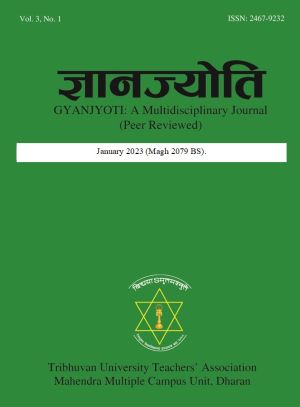Influence of Training Programs on Motivation in Selected Cooperatives in Nepal
DOI:
https://doi.org/10.3126/gyanjyoti.v3i1.53037Keywords:
Competency, employee, job knowledge, skills, satisfaction, techniquesAbstract
This study aims to examine the influence level of training on employee motivation in selected Saving and Credit Co-operative Sector in Kathmandu valley. This is a descriptive study. The study applied a quantitative research design. Primary data were collected through a structured questionnaire. The study applied judgmental sampling. Responses were entered in Statistical Package for Social Science (SPSS), where statistical analysis was done. Inferential statistics i. e., correlation, and regression analysis were applied for data analysis. Multiple correlations indicate that employee competency, employee job knojob knowledge, technique, skill, and high correlation with motivation. The multiple linear regression model of employee motivation is significantly well-fitted to the given dataset. There is a satisfactory level of a significant and positive relationship between employee competency and motivation. The regression coefficient indicates that there is an insignificant and positive correlation between employee job knowledge and motivation. Both employee technique and employee skill have an insignificant and positive relationship with motivation. There is a significant, positive, and low relationship between employee morale and motivation. It is concluded that there is a significant relationship between dimensions of training and employee motivation. The training program helps to increase the motivation of employees in Cooperative Societies. The findings of this research study particularly support the Goal-Setting Theory. According to this theory, high self-efficacy individuals should be well-trained to achieve goals that lead to employee motivation. The research study will be helpful to the policymaking level both in the government and private sector.




